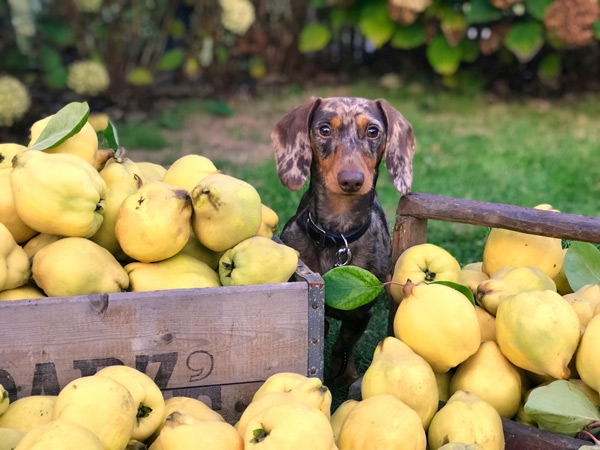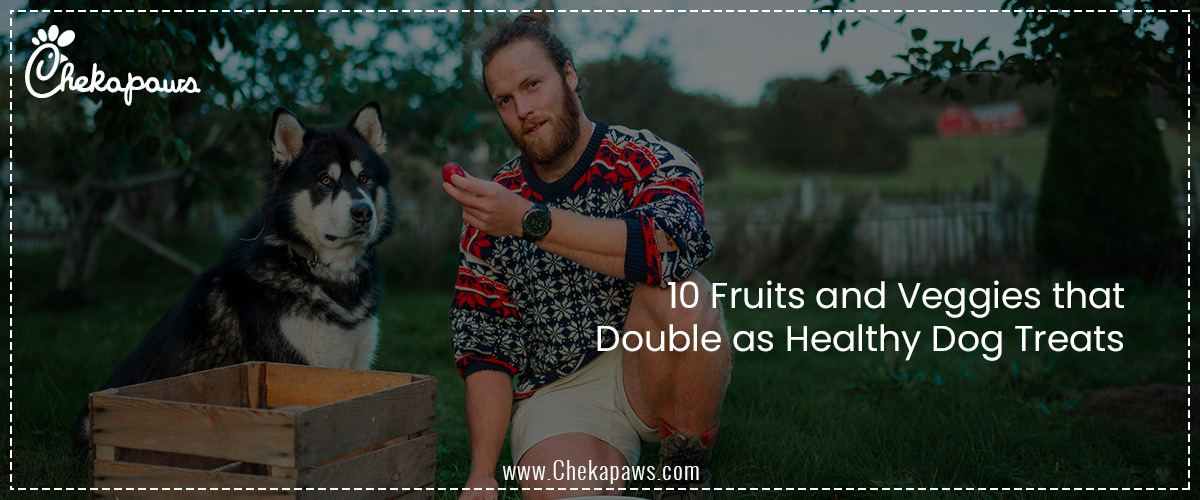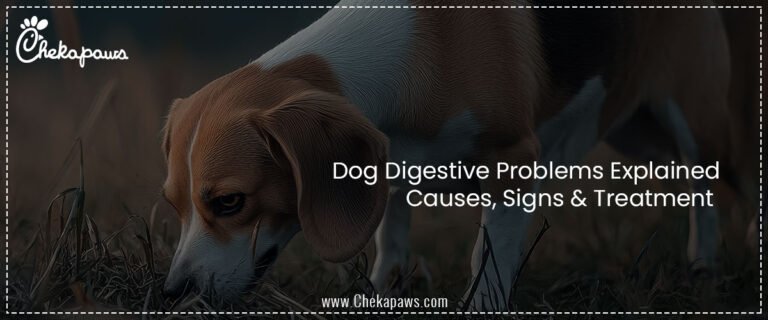Dogs are more than just our loyal friends; they are members of our family. As pet owners, we’re always looking for the best ways to maintain our animals’ wellbeing. The common fruit and vegetable is a vital (and frequently disregarded) addition to your dog’s care kit. When given in moderation, these plant-based treats are safe for dogs and can have amazing health advantages.
Ten fruits and vegetables that can be used as nutritious dog treats will be covered in this extensive guide, along with information on how to serve them safely, their advantages, and potential drawbacks. There are natural, low-calorie solutions that are full of vitamins and minerals, whether you’re training a puppy or caring for an older dog.
Table of Contents

Why Choose Fruits and Vegetables as Dog Treats?
While dogs don’t need to consume fruits and veggies as people do, these organic treats provide:
- Low-calorie training or reward alternatives
- Minerals and vitamins such as fibre, potassium, A, and C
- Hydration and sugar-free natural sweetness
- Support for digestion from antioxidants and natural fibre
A majority of commercial sweets are filled with artificial flavors, preservatives, and empty calories. You gain control and peace of mind when you choose fresh fruits and vegetables.
How to Safely Introduce Fruits and Veggies
When introducing your dog to new foods:
- Begin with modest amounts and keep an eye out for allergic responses.
- Wash produce well to get rid of residues or pesticides.
- Steer clear of flavoring (no butter, garlic, onions, salt, etc.).
- To avoid choking, cut into bite-sized portions.
- For information on any dietary restrictions, speak with your veterinarian.
Now let’s explore the top ten!
Carrots – The Crunchy Classic
Carrots are naturally sweet and crisp, which is why most dogs love them. They taste well cooked, frozen, or uncooked.
Nutritional Advantages:
- Vitamin A, or beta-carotene, promotes immunological and visual health.
- Fibre facilitates digestion.
- Calorie-efficient and ideal for controlling weight.
Serving Recommendations:
- Raw carrot sticks for munching
- Puppies’ frozen chunks for teething
- Senior dogs can be mashed or steam-cooked.
Pro Tip: To add more fibre to your dog’s diet, grate carrots and add them to their meal.
Blueberries – Tiny Antioxidant Powerhouses
Why Dogs Love Them:
Dogs love these bite-sized berries because they are naturally sweet and chewy.
Advantages for Nutrition:
- Rich in anthocyanins and other antioxidants
- Fibre and vitamin C.
- supports brain function and reduces inflammation.
Serving Suggestions:
- As training rewards, they can be frozen or fresh.
- mixed into smoothies that are safe for dogs.
- Included into homemade dog treats
Pro Tip: Freeze each one separately and serve as a refreshing snack on hot days.
Apples – Sweet and Satisfying (Minus the Seeds)
Why Dogs Love Them: Apples add a delightful crunch and are juicy and crispy.
Nutritional Advantages:
- Packed with Vitamins A and C
- Excellent fibre source
- promotes digestive and cardiac health
Serving Recommendations:
- Slices should be thin; always take out the seeds and core!
- Dried apple crisps without added sugar
- Excellent as a garnish for meals
- Apple seeds are cyanide-containing, so always remove the core completely.
Green Beans – Low-Calorie and Fiber-Rich
Why Dogs Love Them: It’s full of texture, chews easily, and has a mild flavor.
Nutritional Advantages:
- Packed with fibre
- Low in fat and calories
- Filled with Vitamins K and C
Serving Suggestions:
- Steamed or raw (cut into small pieces)
- Frozen beans for a chewy snack
- Mixed with kibble for picky eaters
Pro Tip: Use as a low-calorie filler for dogs on a weight loss plan.
Watermelon – Hydration in a Treat
Why Dogs Love It: Sweet, juicy, and incredibly refreshing, particularly during the summer.
Nutritional Advantages:
- Hydration-promoting high water content
- High in vitamin A and lycopene
- Promotes immunological and cardiac health
Serving Recommendations:
- Cubed and cooled
- In silicone molds, frozen
- Incorporated into frozen dog treats
Pumpkin – Gut Health Hero
Why Dogs Love It: Pumpkin’s natural sweetness and smooth texture make it a great food for sensitive stomachs.
Nutritional Advantages:
- Rich in soluble fibre
- Relieves diarrhoea and constipation
- Rich in potassium and vitamin A
Serving Recommendations:
- Either freshly cooked or canned (simple only)
- Add to meals to aid in digestion.
- Place into a Kong and keep it frozen.
Pro Tip: A can of unsweetened pumpkin is a great remedy for upset stomachs, so keep one in the cabinet.
Bananas – A Natural Energy Booster
Why Dogs Love Them: Soft, sweet, and satisfying—ideal as a pre-walk snack or for energetic dogs.
Nutritional Advantages:
- Vitamins B6, C, and potassium
- supports the function of muscles and nerves
- includes natural sugars to provide energy.
Serving Recommendations:
- Frozen and sliced
- Mashed into dog-safe pancakes or muesli
- Peanut butter combined with frozen desserts
Warning: high sugar content; give sparingly, especially to dogs who are overweight.
Cucumbers – Cool and Refreshing
Why Dogs Love Them: Cucumbers are great for snacks because of their mild flavour and high water content.
Nutritional Advantages:
- Incredibly low in calories
- Cooling and hydrating
- Includes silica for healthy joints.
Serving Recommendations:
- Slices of thin cucumber
- Frozen and diced
- Mixed with mint to make a refreshing beverage that is safe for dogs.
Pro Tip: Apply slices of cucumber as a treatment for fresh breath.
Strawberries – Sweet but Full of Fiber
Why Dogs Love Them: Soft and naturally sweet, this type is perfect for little breeds or older dogs.
Nutritional Advantages:
- Rich in fibre and vitamin C
- contains immune-boosting antioxidants.
- encourages a healthy coat and skin
Serving Recommendations:
- Cut in half or mashed
- Yogurt-based frozen desserts
- mixed into a bowl of smoothies
Due to the natural sugar content, use caution when consuming large amounts.
Fruits and Veggies Dogs Should Avoid
Not all fruit is suitable for dogs. Avoid some of these:
- Raisins and grapes are extremely poisonous and can lead to renal failure.
- Persin, which is poisonous to dogs, is found in avocados.
- Garlic and onions have the potential to harm red blood cells.
- Green tomatoes: Unripe tomatoes and stems contain solanine, which is toxic.
- Cyanide is found in the pits and stems of cherries.
- Wild mushrooms: Some types may be poisonous.
Before introducing something new, always make sure!
Incorporating Produce into Your Dog’s Diet
These fruits and vegetables can be easily incorporated into your dog’s daily diet in the following ways:
- Toppers for Meals
Top kibble or wet food with pureed or finely diced vegetables. - Cold Snacks
Fruit mixes and vegetable purees can be frozen using silicone moulds or ice cube trays. - Handcrafted Sweets
Make your own dog biscuits using pumpkin, sweet potatoes, or mashed bananas. - Puzzle Playthings
To stimulate the mind, stuff Kongs or other toys that contain produce combinations and freeze them. - Smoothies Combine dog-safe ingredients such as yoghurt, berries, and bananas to create lickable treats.
Final Thoughts: Treating with Purpose
Fruits and vegetables are a natural approach to promote your dog’s health, not just a trendy accessory. These munchies can:
- Boost your digestion
- Encourage a healthy coat and skin
- Strengthen your immune system
- Assist in managing weight
- Just keep in mind that moderation is essential. No more than 10% of your dog’s daily calories should come from treats.
- Every bite of these ten dog-safe fruits and vegetables can bring happiness, health, and love.







